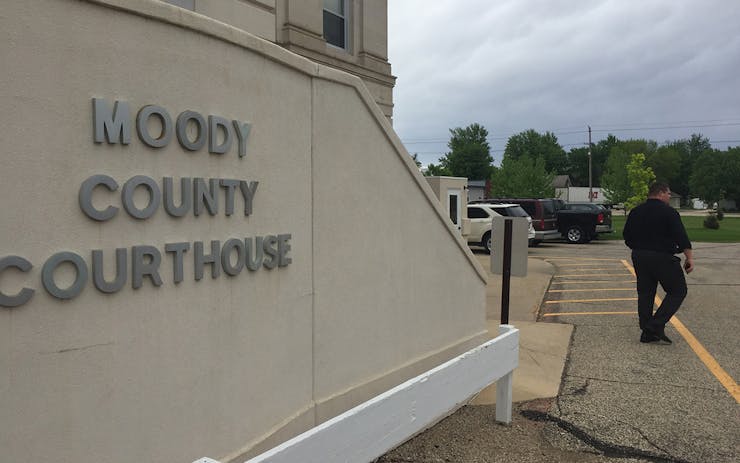Update, 11:30am PDT: The jury in the Flandreau Santee Sioux cannabis trial has acquitted Eric Hagen of all charges. Read the full story from Pat Radigan later today.
Colorado cannabis consultant Eric Hagen took the stand in his own defense on Tuesday, and his attorney presented and concluded their case in one day, setting the stage for final arguments on Wednesday morning.
Hagen, CEO of the cannabis advisory firm Monarch America, stands accused of three cannabis-related felonies in connection with a failed resort and grow operation on the Flandreau Santee Sioux reservation in South Dakota. State prosecutors have spent two days attempting to peg Hagen as the mastermind behind an illegal marijuana operation. When it came time for the defense’s case, Hagen’s attorney went after the motivations and actions of the state—including state Attorney General Marty Jackley.
'From beginning to end, we were looking for a stop sign.'
After giving the jury a brief idea of his background in business and the cannabis industry, Hagen addressed his interactions with Jackley. After initially setting a meeting with the attorney general, Hagen testified that the only date that Jackley’s office said was open turned out to the the same day he was offered by the US Attorney.
Because the tribal ordinance was overseen by federal authorities, Hagen said priority was given to the meeting with the US Attorney. He asked Jackley’s office for an alternate date. Hagen testified that he tried two more times to set up an appointment with Jackley, but that his calls were never returned.
That failed meeting was brought up again during Hagen’s cross examination. Deputy attorney general Bridget Mayer, with Mayer grilled the defendant on his attempt to meet with her boss. Hagen testified that if Jackley told him that he would be prosecuted, Hagen would have abandoned the project. Mayer wasn’t satisfied with that answer.
“So the attorney general for the state of South Dakota has to meet your schedule?” Mayer asked.
Hagen said no, adding, “I don’t know why you’re getting combative with me,” when Mayer begin to raise her voice and limit Hagen’s responses to mostly yes or no answers. Mayer then turned her attention to establishing Hagen as an expert in the cannabis industry. Hagen referred to his own experience as “above average,” and disputed Mayer’s claim that his interview with FBI agent David Keith showed his acumen in the industry.
The information Hagen provided to Keith is “common sense in the industry,” Hagen said. He reiterating his role in Monarch America as the “business guy.” Hagen briefly detailed the work he has done for 14 different tribes around the country, and repeatedly told Mayer that his main concern was his fiduciary responsibility to his company’s stockholders.
“First Plane Out of Here”
Hagen testified that he believed the Flandreau Santee Sioux project was legally protected by tribal sovereignty. After meeting with federal, local and state officials, he said, he wasn’t made aware of any issue with non-natives working within the grow facility. Had they been informed of any legal concerns about that, Hagen testified that he and Hunt would have been on “the first plane out of here.”
“There was no concern at all,” Hagen said. “It never even crossed our mind.”
The subject of tribal sovereignty was touched on during the first two days of the trial, but took center stage on Tuesday morning when the defense called the tribe’s lawyer and president as its first two witnesses.
Tribal Leaders on the Stand
Seth Pearman, the tribe’s attorney, took the stand and addressed the subject of federal enforcement policy with regard to cannabis and Indian Country. Defense attorney Mike Butler introduced the US Department of Justice’s Cole Memorandum and the Wilkinson Memorandum into evidence, and had the tribe’s legal representative walk the jury through the significance of those federal memos.
'There was sort of a nod... We perceived that as a nod to go ahead and order seeds.'
The Cole Memo laid out eight guidelines for states to adhere to when legalizing adult-use cannabis, while the Wilkinson Memo extended those same guidelines to sovereign tribes. It was because of the Wilkinson Memo, Pearman said, that the tribe began discussions about a cannabis grow/resort project. That led them to a meeting with acting US Attorney Brendan Johnson in Sioux Falls.
The meeting with Johnson then led Pearman to reach out to DEA agents in the pursuit of seeds. The agent he spoke with, Pearman said, indicated that the DEA worked under the same federal department—the US Department of Justice—that issued the Cole and Wilkinson Memos; therefore the DEA was instructed to follow the same guidelines as federal prosecutors.
With that conversation, Pearman said he got the indication the tribe could pursue the acquisition of seeds under a don’t ask, don’t tell policy.
“In this process there was never a green light,” Pearman said. “There was sort of a nod, never a thumbs up. We perceived that as a nod to go ahead and order seeds.”
After indicating to US Attorney Johnson that the tribe planned to explore the possibility of legalizing cannabis on tribal lands, Pearman and tribal officials met with South Dakota Attorney General Jackley. The meeting included tribal representatives, Jackley, and a pair of unnamed state Department of Crimininal Investigation (DCI) agents. Pearman said Jackley’s expressed concerns centered on who would be consuming cannabis on tribal lands. Pearman indicated that at that point, the tribe and Jackley began a dispute over the state’s authority to arrest non-natives on tribal land—a long-running point of contention between many tribes and state authorities across the nation.
State vs Tribe: Arrest Authority?
The dispute between the state and the tribe became even more clear on cross examination, as Mayer clashed with Pearman over the tribe’s authority to legalize cannabis for non-natives on any land inside the borders of the state of South Dakota.
Mayer asked Pearman if he would agree the state had authority over non-natives on tribal land. Pearman allowed how that was true on “some matters.” Mayer then turned her attention to the two federal memos. On more than one instance, Mayer asked Pearman to agree to specific phrases and sentences within the memos, with Pearman instead choosing to read the entire sentence or clause to clarify for the jury. When Mayer asked Pearman if the memo shifted the burden of policing cannabis to the state level, Perlman pointed out that the Cole Memo referenced “state and local” authorities, and repeated the phrase before directly interjecting to Mayer that the tribe’s cannabis policy was enacted based on the legal concept of tribal sovereignty.
The tribe’s sovereignty was then further discussed by tribal president Tony Reider. On cross examination, Reider admitted that the state had the right to its own cannabis policy because it is “sovereign, like the tribe,” but also contended that the tribe had the same right under the Wilkinson Memo. Reider testified that at no point in the process did Jackley indicate there was an issue with non-native individuals working at the facility.
Reider also testified that the initial meeting was the only time Jackley and the tribe discussed the project prior to charges being filed against Hagen. Reider said the attorney general expressed an interest in speaking to the tribe after the indictment. Jackley’s office informed the tribe of the indictment the day before it was announced, Reider said, but also indicated that the tribe declined the invitation to speak with Jackley at that time.
Tribe: It’s Our Project, Not Hagen’s
On his direct examination, Reider was quick to tell the defense that the tribe was mindful of law enforcement’s input throughout the process.
“From beginning to end, we were looking for a stop (sign),” Reider said.
“Did you get that from the attorney general?” asked defense attorney Mike Butler.
“No.”
Countering the prosecution’s portrayal of Eric Hagen as the mastermind of the cannabis operation, Reider firmly stated that the development was the tribe’s, not Monarch America’s. “Whose marijuana is it?” defense attorney Butler asked. Reider said that everything belonged to the tribe. Flandreau Santee Sioux officials, he said, made all the decisions when it came to both the grow facility and the proposed consumption lounge.
At the conclusion of its case, the defense again asked to have all charges dismissed for a lack of evidence, but the motion was denied. The prosecution declined the opportunity to present a rebuttal, ending the evidentiary portion of the trial.
Both sides will now present closing arguments on Wednesday morning, and then the case will be handed over to the jury for deliberations. Stick with Leafly for updates as the trial continues.





